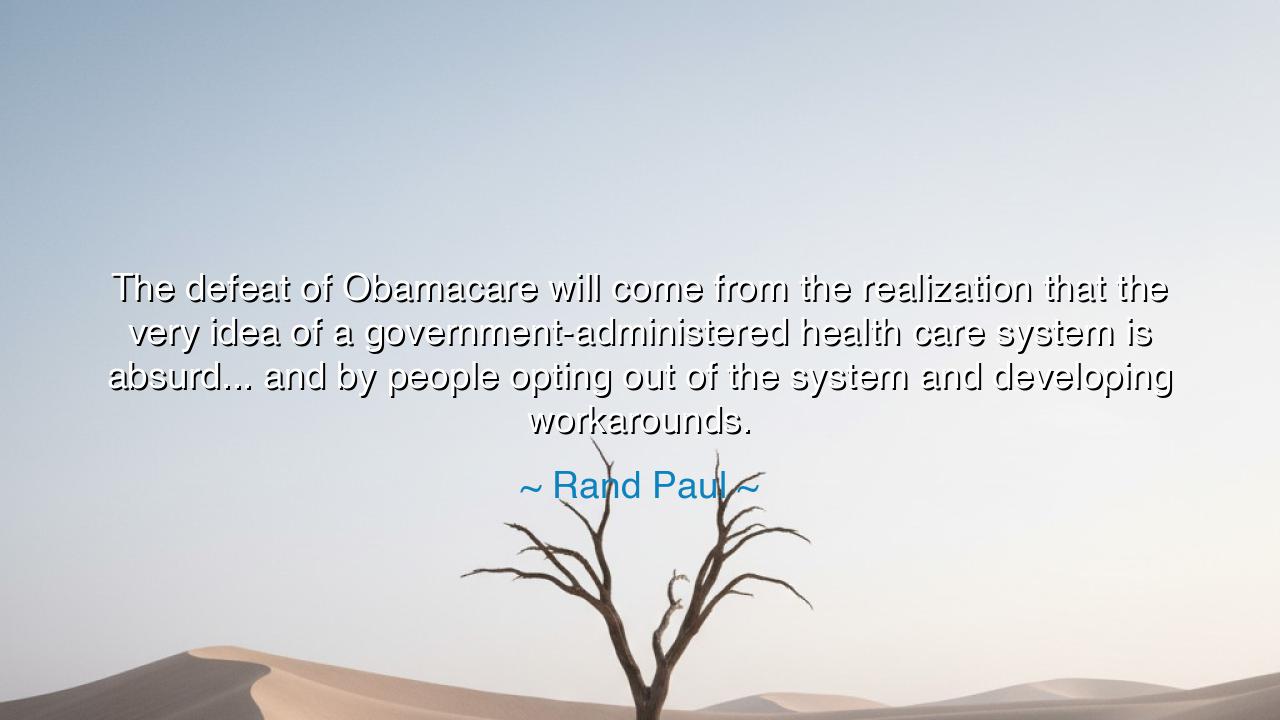
The defeat of Obamacare will come from the realization that the
The defeat of Obamacare will come from the realization that the very idea of a government-administered health care system is absurd... and by people opting out of the system and developing workarounds.






In the days when men still contended over the shape of their governance, Rand Paul spoke words that echoed beyond politics and into the chambers of philosophy: “The defeat of Obamacare will come from the realization that the very idea of a government-administered health care system is absurd... and by people opting out of the system and developing workarounds.” His utterance was not merely the cry of one man against a law, but a meditation on human nature, liberty, and the limits of control. It was the reminder that the spirit of man withers when bound too tightly by the designs of bureaucracy, and that every time a system grows too vast, the living pulse of individuality begins to fade.
In this saying, the absurdity of a government-administered system does not lie solely in inefficiency or cost—it lies in the arrogance of imagining that a centralized power can understand the infinite subtleties of human need. Just as the farmer knows the soil better than the distant king, so does each soul know its own pains and remedies. When men surrender such intimate knowledge to a faceless institution, they trade sovereignty for security, and in doing so, awaken the slow tyranny of dependency. Rand Paul’s words call upon the ancient truth that every empire falls when it begins to believe it can manage the hearts and bodies of its citizens as though they were entries in a ledger.
Consider the tale of Diocletian, the Roman emperor who sought to control every trade, every price, every hand that tilled or forged in the empire. His Edict on Maximum Prices—intended to create fairness and stability—brought instead famine, black markets, and rebellion. Farmers hid their grain; merchants traded in secret. The system decayed not from outside invasion, but from the quiet resistance of those who refused to be ruled by distant decrees. So too, Paul foretells, would the fate of any government that sought to dictate the sacred exchange between healer and healed. When law intrudes upon the pulse of life itself, people will turn—quietly but irresistibly—toward freedom’s workarounds.
Yet Paul’s vision is not born of despair, but of faith in human ingenuity. He speaks of people “opting out and developing workarounds.” This is no call to rebellion by sword or fire, but by innovation and choice. Where systems become heavy and inflexible, the creative soul finds paths unseen. Just as the early physicians of Greece tended to the sick under olive trees, without sanction or license from any authority, so will modern men and women find new ways to heal, to learn, and to live—outside the dominion of sprawling systems. Thus, the defeat he speaks of is not imposed from above; it emerges from below, from the will of countless individuals choosing to live free.
There is in these words a moral as old as civilization: every imposed order eventually faces the quiet revolution of self-reliance. A system collapses not when it is opposed by armies, but when it is abandoned by hearts. When people cease to believe in its necessity, when they discover they can thrive without its permission, its power dissolves like mist in the morning sun. It is the same truth that humbled the Soviet Union, whose planned economy could not withstand the spontaneous energy of a people who yearned to create and to trade beyond its reach.
Let us then take heed. The lesson is not merely political—it is spiritual. Whenever you find yourself depending too deeply on the machinery of others for your own welfare, remember that freedom is both burden and gift. It demands courage, yes, but rewards with dignity. The true healer is not the government, but the community; the true protection lies not in policy, but in the virtue of self-responsibility. To be human is to act, to build, to care—not because one is ordered to, but because love and necessity compel it.
Therefore, if you seek wisdom in Rand Paul’s warning, let it be this: systems are mortal, but the human will to adapt is eternal. When laws grow rigid, bend toward compassion. When bureaucracies grow blind, open your own eyes. And when a structure claims to own your well-being, rise and prove by your actions that life itself is the domain of the free. Work, learn, heal, and teach as though no permission were needed—because the truest liberty is lived, not granted.
So may every man and woman remember: freedom withers when unused, and systems fall not by decree, but by irrelevance. Let your life be one of those workarounds that proves the wisdom of Paul’s words. Build small communities of care, trust your neighbors, create solutions that need no approval. For when people once again believe in their own power to shape destiny, then no empire—be it political, economic, or medical—can stand against the tide of awakened souls.






AAdministratorAdministrator
Welcome, honored guests. Please leave a comment, we will respond soon